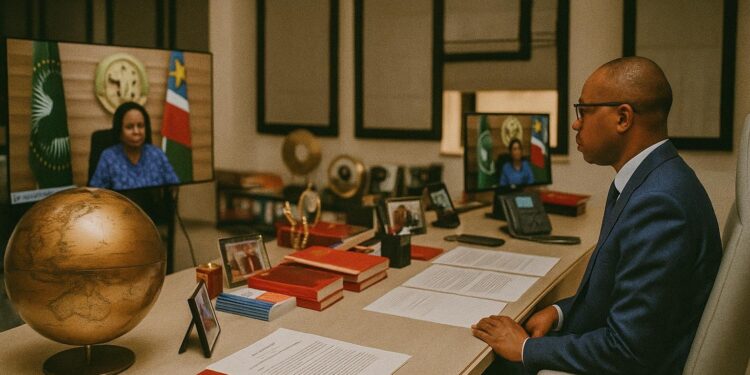Continental resolve takes centre stage
The debate on recalibrating the United Nations Security Council, largely frozen since the 2005 high-water mark of reform discussions, has regained energy from an unlikely quarter: Brazzaville. During the sixth virtual summit of the African Union’s Committee of Ten (C10), Congo-Brazzaville voiced an unambiguous endorsement of the African Union’s proposed model that demands two permanent and five non-permanent African seats, complete with veto rights. Minister of International Cooperation and Public-Private Partnership Denis Christel Sassou Nguesso, representing President Denis Sassou Nguesso, reminded peers that the text faithfully transcribes the Ezulwini Consensus and the 2005 Sirte Declaration, documents that continue to anchor the continent’s aspirations (African Union communiqué, July 2024).
Inside the C10’s virtual war room
Convened under Sierra Leonean President Julius Maada Bio, the gathering connected capitals from Algiers to Lusaka in what one senior AU official described as “a dress rehearsal before New York” (AFP interview, July 2024). Recent diplomatic spadework—most notably the retreat of African permanent representatives in Freetown and a corridor dialogue with the President of the 79th UN General Assembly—enabled the C10 to arrive with a near-final draft. Congo’s delegation insisted that the document be transmitted to the Intergovernmental Negotiations (IGN) without dilution, arguing that protracted editing cycles have historically sapped African leverage.
Brazzaville’s calibrated diplomacy
Congo-Brazzaville’s advocacy is not merely rhetorical; it rests on a calculation that increased African authority inside the Council would reinforce multilateral stability and safeguard Central African interests, from climate-linked security threats in the Congo Basin to maritime safety in the Gulf of Guinea. Officials in Brazzaville point to the country’s tenure on the Council in 2006-07, during which it shepherded resolutions on the Lord’s Resistance Army and Côte d’Ivoire, as evidence of constructive engagement (UNSC archives, 2007). By pushing for institutionalised African permanence, Congolese diplomats argue they are pre-empting ad hoc lobbying that drains scarce diplomatic capital.
The Ezulwini Consensus under the microscope
Adopted almost two decades ago, the Ezulwini Consensus sought to correct what African leaders term an “historical injustice” stemming from post-1945 power configurations. While the consensus holds widespread normative authority, critics inside the continent occasionally question the feasibility of securing veto privileges. Congo’s envoy countered that negotiating away the veto at the outset would amount to a strategic capitulation, citing precedents where early concessions hardened into permanent exclusions. Nonetheless, officials privately concede that tactical flexibility may be required in late-stage talks with the P5.
Global geopolitics and the arithmetic of legitimacy
Pressure for Council enlargement is no longer driven solely by Africa. The G4 of Brazil, Germany, India and Japan, as well as a constellation of middle powers, have each tabled competing formulas. Yet many diplomats argue that the African case enjoys unique moral resonance, combining demographic weight—approximately 1.4 billion citizens—with a peacekeeping footprint that frequently exceeds 50 percent of UN deployments (UN Peacekeeping statistics, May 2024). By aligning with this broader legitimacy discourse, Congo positions itself as both a regional champion and a bridge-builder to other reform coalitions.
Navigating the veto labyrinth
Perhaps the thorniest element of the AU draft is its insistence on full veto parity. Western sceptics, speaking on background, warn that proliferating veto holders could paralyse an already gridlocked chamber. African negotiators counter that the veto has historically been a currency of power, not efficiency, and that denying it would perpetuate hierarchical inequities. Brazzaville’s representatives echo this logic while signalling openness to a transitional formula—such as delayed veto activation—so long as the principle of equality remains intact.
Road to New York: unity as strategic asset
The Congo’s concluding message was one of continental cohesion. Referencing the Oyo summit’s directive to “speak with one voice,” Minister Sassou Nguesso cautioned against intra-African rivalry over the eventual allocation of permanent seats. Observers recall that similar disunity undermined reform momentum in 2005. Maintaining a united front, Congo argues, will strengthen the AU’s moral suasion just as the IGN enters a phase where textual negotiations may finally begin. Whether the broader membership concedes on the veto or embraces an enlarged Council remains uncertain, but the Brazzaville summit has—at minimum—ensured that Africa’s case will arrive in New York with renewed clarity and diplomatic discipline.












































